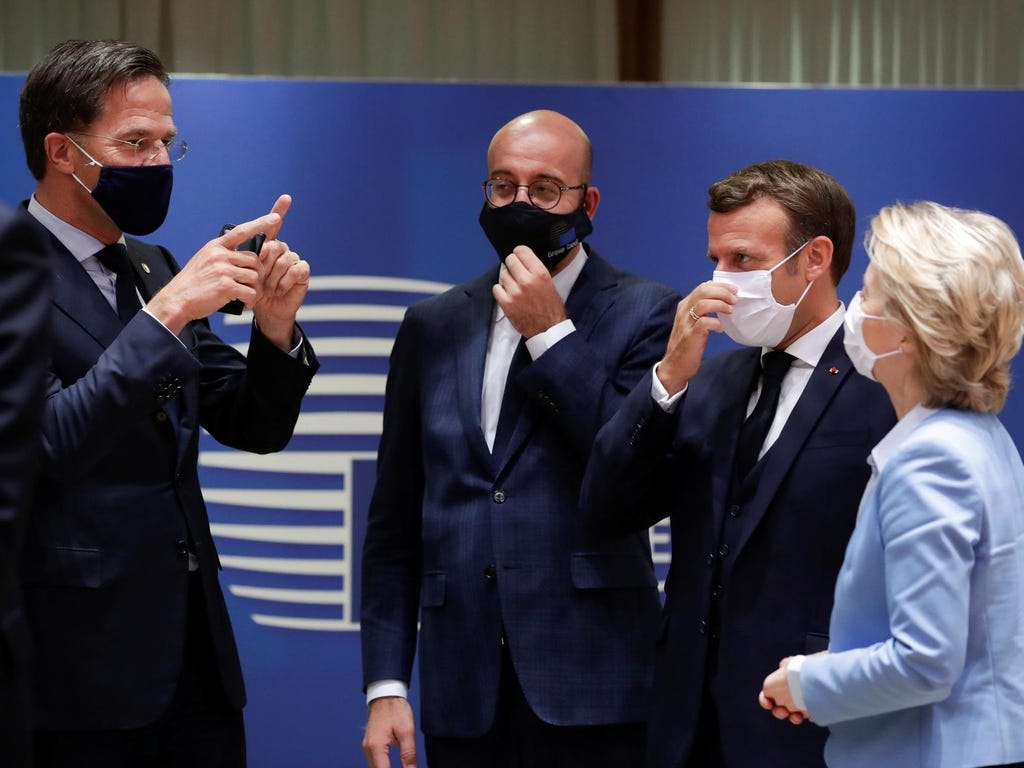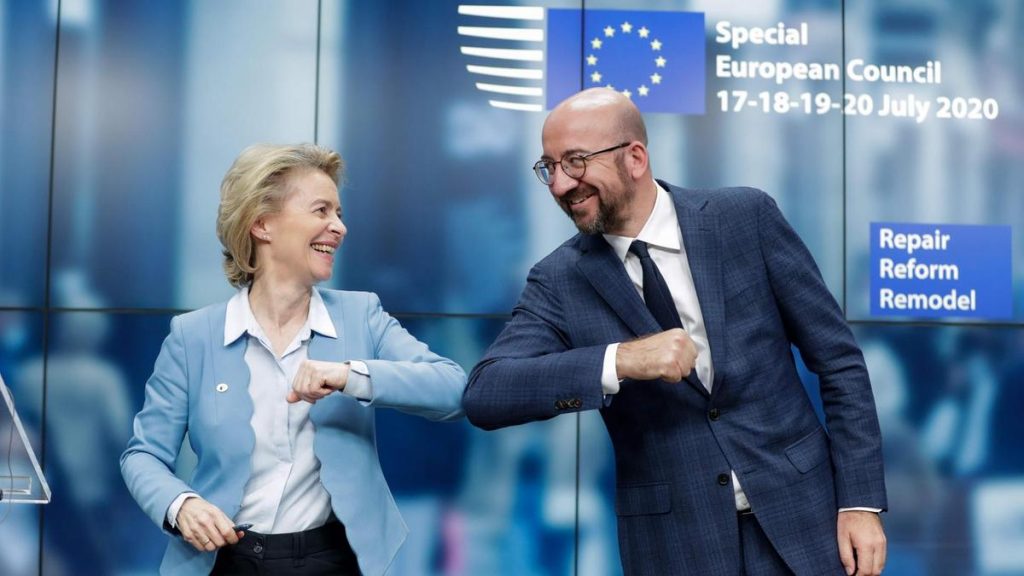For the first time in nearly seven decades of Europe’s union, the 27-member bloc is prepared to jointly raise billions of euros on the capital markets. It is rare for European solidarity to go beyond declarations of shared values, the thicket of common regulations, cluster of continent-wide institutions and the more partial 19-country eurozone.
The new, more costly form of fraternalism will appear as grants to the tune of 390 billion euros, doled out from a coronavirus recovery fund to EU countries hardest hit by the pandemic. There will also be a further 360 billion euros in cheap loans. The deal has been called an “historic”, “pivotal”, even transformative moment for the bloc.
The real question, of course, is what sort of transformation it brings about. Does the one-off pooling of debt obligations knit Europe closer and in a more meaningful fashion? Or does the deal carry within it the seeds of greater European disunity?
Early reports are encouraging. The markets, often an overly reflexive gauge of political sense and sensibility, have responded with good cheer. European stocks hit a four-month high last week and the euro traded at its highest against the dollar since September 2018. Analysts suggested investors would, in short order, start to ditch US assets in favour of European equities and bonds, even as rising confidence in the euro’s long-term prospects bolsters its role as a reserve currency. Indeed, the latest fund manager survey conducted by Bank of America, one of the largest US banks and financial services companies, had investors raising their allocation to eurozone equities by nine percentage points, the largest increase for any region.
European leaders and policy experts, meanwhile, made clear they were rather pleased with themselves. Charles Michel, president of the European Council, declared the deal was a sign “Europe is united, Europe is present. We have demonstrated that the magic of the European project works”. German chancellor Angela Merkel said, “Europe has shown it is able to break new ground”.
French president Emmanuel Macron added that the deal “changes everything”. Wolfgang Ischinger, a former German ambassador and current head of the Munich Security Conference, viewed the joint economic rescue package as a means of “assuring the survival of the European project…Our political future”. And former Italian prime minister Matteo Renzi tweeted that the EU is defeating the populists “750 (billion) to zero,” a reference to the size of the plan in euros.
These are bold claims. They are all mostly true, at least at this point in time, within the first week of the EU’s game-changing move to create a de facto federal deficit and execute its biggest constitutional leap since the 1999 creation of the euro. But it is what happens here on in that will determine the EU’s health and prospects.
The EU-backed bonds haven’t even been issued and this is already starting to be a problem in Italy
So, what could happen? Three issues are worth watching.
First, the right of any EU member to question another country’s economic recovery and reform plans, thereby delaying disbursement of funds for up to three months at a time. The Dutch insisted on this form of limited supervision of one national government by another.
It could, says Mujtaba Rahman, Europe head of the political risk consultancy Eurasia Group, render the deal “unworkable”. Not only could it poison relations between EU leaders, it might embolden populists in disparate countries to push Eurosceptic positions. It could also entrench mistrust of the European project if citizens of a beneficiary country believe other governments are objecting in bad faith.
The EU-backed bonds haven’t even been issued and this is already starting to be a problem in Italy, the biggest beneficiary of the coronavirus recovery fund. Even as Prime Minister Giuseppe Conte was celebrating the 209 billion euros Italy will receive in grants and loans, far right parties took aim at his “unconditional surrender” to Brussels and alleged willingness to weaken Italian sovereignty.

While the EU’s new debt mutualisation deal does not require the onerous control that poisoned relations between Brussels and Athens during the Greek debt crisis, it could still lead to endless arguments at summits and divisive negotiations that go on for years. This could potentially make for rather less European fraternal feeling.
Second, the deal’s ambiguous language on the link between EU funding and member states’ rule of law obligations. The European Commission is now supposed to design the mechanism to enforce sanctions on countries that violate rule of law.
But there’s no clarity on what needs to be done, what can be done, what will be done and when. Meanwhile, the leaders of Hungary and Poland, big winners from the EU’s overall budget deal, claim cash handouts are no longer conditional on good governance. Mr Macron has already acknowledged that “the ambitions we had justified the concessions, so that we could reach a compromise.” But it is fair to say this raises a question about whether the EU remains a project of values as well as economics.
Finally, there is the European Parliament’s stated objection to the deal. Many members of the European Parliament want to settle the question about funding countries that violate the rule of law. Others are opposed to massive cuts to so-called futures programs that cover health, research and climate issues. Without forward thinking and planning, so the argument goes, Europe won’t be competitive in the post-pandemic era.
Legislators won’t get to vote on the coronavirus recovery plan per se but in December, an absolute majority needs to pass the EU’s budget, to which that deal is linked. Parliament’s grumbling may be seen as largely symbolic, but it still indicates a deeper discomfort with big-ticket, short-term fixes that ignore, as the chair of parliament’s budget committee said, “the EU’s long-term objectives”.
Clearly, much will depend on how the deal is implemented. But the very way it was reached — after nearly five days of intense haggling — points to emerging new fault lines within Europe. Germany, usually one of the more fiscally cautious in the EU, championed the pooled promissory note.
The Netherlands stepped into the gap left by Germany and led the so-called “frugal four”, which included Austria, Sweden and Denmark. Subsequently, there were claims that the traditional Franco-German partnership is no longer in the driver’s seat.
This raises the question of who leads as Europe steers its big win down the straight path.
Rashmee Roshan Lall is a columnist for The National


